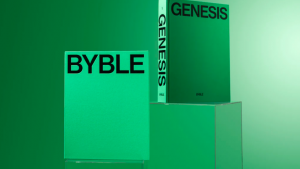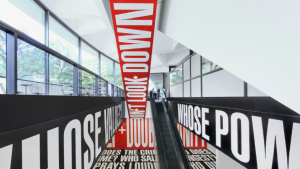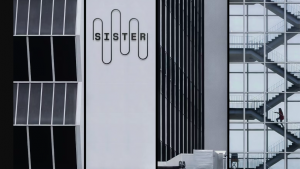Women appear in the comic universe mostly as the girlfriends of superheroes or damsels in distress. And despite the fact that major comic companies such as DC and Marvel are getting better when it comes to featuring a broader spectrum of gender, race and body types, the female-to-male ratio of creators across the board still leaves much to be desired.
South African Danelle Malan is fashioning a space in South African comics for female creators. Malan is the co-author with her partner Ben Geldenhuys of Cottonstar, a weekly web comic. “Cottonstar is a love project,” Malan says, “literally, because I’m marrying my co-artist.”
Set in a post-apocalyptic, dystopian Southern Africa, the story follows the adventures of a young man named Renier, who accidentally got himself hired as a crew member aboard Cottonstar, a pirate ship captained by Domino Hartwick.
“I do the writing, colouring, background painting and editing, and I am what Ben and I jokingly refer to as the ‘PR machine’. Ben does line work and tones and we usually letter together.”
Born and raised in Cape Town, Malan studied painting at the Michaelis School of Fine Art. But even before her fine arts degree and Cottonstar, as a young girl she was drawing characters she’d seen in animated movies and television shows.
“One day my mother (bless her for always feeding my voracious appetite for books) gave me a copy of David Wenzel’s iconic graphic novel adaptation of The Hobbit. The beautiful, hand-painted illustrations were magic to me.”
That was the biggest turning point for Malan; from then onwards, her interest in comics and graphic novels only grew.
Cottonstar is part of the comics boom in South Africa, where several creators have begun to publish work with more diverse viewpoints and characters. The result is a larger mainstream presence of locally made comics in the country.
Currently in its fourth chapter online and third chapter in print (the next chapter will be available at Free Comic Book Day 2015), Cottonstar is both a paper and pixel success. Its circulation is growing on both platforms, but audience reception to Malan as a female creator remains sceptical at best, she says.
Creating art as a woman means that your work often gets viewed in a harsher, more judgmental light, Malan notes.
“I can’t pretend to speak for all female artists, especially not women of colour and others who have more challenges stacked against them. Being a white female artist, I still enjoy less discrimination than many other female artists in this country,” she adds.
“That being said, it can be an uphill battle for sure. People’s attitudes have been varied from neutral to patronising to downright malicious.”
Much of that she experienced online. The internet, she says, is often not a “female-friendly space”, with other uses taking full advantage of the anonymity.
“Standing up for yourself and calling out attitudes of discrimination leads to you being called a ‘feminazi’ and the ‘PC Police’ and various other insults I won’t mention here!”
But for all the insults and difficulty, Malan detects an upswing: “At the moment I see an explosion of high-quality, interesting, engaging comics by women, transgender and queer folks online.”
Squeers, a comic about two gay squirrels living in the oldest cultivated pear tree in the Cape Town Company’s Garden, is one such example created by Roberto Millan .
Published in LGBTI community newspaper The Pink Tongue, Squeers makes social commentary for an underrepresented community within the local comics culture but it is not afraid to combine humour and politics.
“There are a great many good people, of all genders, doing their best to combat sexism in comics, art and society at large,” says Malan.
“A big resounding ‘Yes’, there IS room for women to grow in comics! There are just a lot of bumps in the road that need navigating.”











